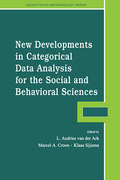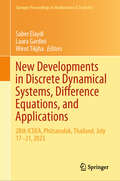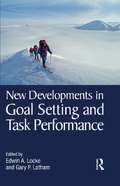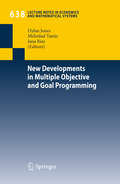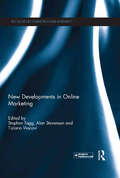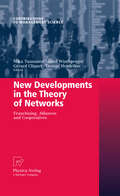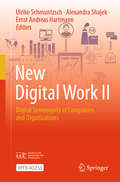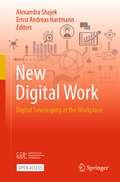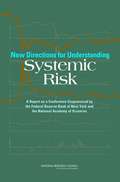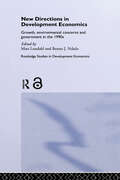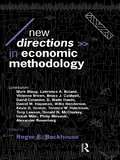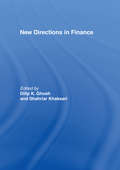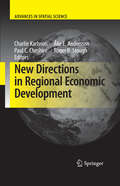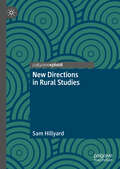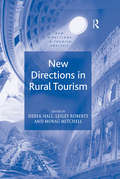- Table View
- List View
New Design for Old Buildings
by Roger Hunt Iain BoydThis book is a celebration of good new design for old buildings and the SPAB philosophy that good new architecture can sit happily alongside old and is preferable to pastiche. Endorsing the value of architects who are engaged to work in the historic environment, this book explores design, materials and technical considerations in creating the best low energy, ecological and sustainable retrofits. It has never been more important to understand how old buildings can be adapted to make them useful and sustainable in the future. Showcasing the best examples of imaginative design and best practice, this book illustrates how old buildings can be made sustainable through the best new design and puts these design exemplars into a historical and philosophical context. With illustrative case studies and interviews throughout, including formal buildings, churches, domestic buildings, commercial, industrial and agricultural from all periods in the UK, New Design for Old Buildings provides essential guidance on good, imaginative new design for old buildings.
New Developments in Categorical Data Analysis for the Social and Behavioral Sciences (Quantitative Methodology Series)
by L. Andries van der Ark, Marcel A. Croon and Klaas SijtsmaCategorical data are quantified as either nominal variables--distinguishing different groups, for example, based on socio-economic status, education, and political persuasion--or ordinal variables--distinguishing levels of interest, such as the preferred politician or the preferred type of punishment for committing burglary. This new book is a collection of up-to-date studies on modern categorical data analysis methods, emphasizing their application to relevant and interesting data sets.This volume concentrates on latent class analysis and item response theory. These methods use latent variables to explain the relationships among observed categorical variables. Latent class analysis yields the classification of a group of respondents according to their pattern of scores on the categorical variables. This provides insight into the mechanisms producing the data and allows the estimation of factor structures and regression models conditional on the latent class structure. Item response theory leads to the identification of one or more ordinal or interval scales. In psychological and educational testing these scales are used for individual measurement of abilities and personality traits.The focus of this volume is applied. After a method is explained, the potential of the method for analyzing categorical data is illustrated by means of a real data example to show how it can be used effectively for solving a real data problem. These methods are accessible to researchers not trained explicitly in applied statistics. This volume appeals to researchers and advanced students in the social and behavioral sciences, including social, developmental, organizational, clinical and health psychologists, sociologists, educational and marketing researchers, and political scientists. In addition, it is of interest to those who collect data on categorical variables and are faced with the problem of how to analyze such variables--among themselves or in relation to metric variables.
New Developments in Discrete Dynamical Systems, Difference Equations, and Applications: 28th ICDEA, Phitsanulok, Thailand, July 17-21, 2023 (Springer Proceedings in Mathematics & Statistics #485)
by Saber Elaydi Laura Gardini Wirot TikjhaThis compelling book presents remarkable contributions from esteemed speakers who participated in the 28th International Conference on Difference Equations and Applications, ICDEA 2023, hosted at Phitsanulok, Thailand, in collaboration with the International Society of Difference Equations (ISDE) from July 17 to 21, 2023. Embark on an enriching journey through the realms of difference equations and discrete dynamical systems, with practical applications spanning economics, engineering, biology, and related sciences. Immerse yourself in cutting-edge research as you explore new and significant breakthroughs within the fields of difference equations and discrete dynamical systems. This comprehensive compilation spans diverse scientific disciplines, demonstrating the profound impact of these theories and methodologies in practical and tangible settings. From economic modeling to engineering optimization, from biological systems to interdisciplinary applications, this book exemplifies the versatility and relevance of difference equations and discrete dynamical systems. Designed to resonate with a wide audience, including Ph.D. students, researchers, educators, and practitioners, it goes beyond mere dissemination of recent results. It actively fosters the advancement of knowledge, serving as a catalyst for further explorations and innovations across the spectrum of sciences.
New Developments in Eco-Innovation Research (Sustainability and Innovation)
by Jens Horbach Christiane ReifEco-innovations are crucial for reducing the environmental damages arising from economic activities, and are one of the main drivers of a successful transition towards sustainable development and remedying essential climate change problems. This book provides an overview of recent advances in the rapidly growing field of eco-innovation research, adopts an interdisciplinary perspective and outlines the main future developmental trends. A broad range of topics are addressed, including a bibliometric analysis of eco-innovation research, the relationship between eco-innovation and corporate sustainability, eco-innovation system analysis, new evidence on the economic effects of eco-innovation, and the relevance of policy and policy mixes for eco-innovation activities. The book is dedicated to Klaus Rennings, one of the most important representatives of this field, who unexpectedly passed away in September 2015.
New Developments in Engineering Education for Sustainable Development
by Walter Leal Filho Susan NesbitThis book discusses essential approaches and methods in connection with engineering education for sustainable development. Prepared as a follow-up to the 2015 Engineering Education in Sustainable Development (EESD) Conference held in British Columbia, Canada, it offers the engineering community key information on the latest trends and developments in this important field. Reflecting the need to address the links between formal and informal education, the scholars and professionals who contribute to this book show by means of case studies and projects how the goal of fostering sustainable development in the context of engineering education can be achieved. In particular, they discuss the need for restructuring teaching at engineering‐focused institutions of higher education and provide practical examples of how to do so. The book places special emphasis on state-of-the art descriptions of approaches, methods, initiatives and projects from around the world, illustrating the contribution of engineering and affiliated sciences to sustainable development in various contexts, and at an international scale.
New Developments in Goal Setting and Task Performance
by Gary P. Latham Edwin A. LockeThis book concentrates on the last twenty years of research in the area of goal setting and performance at work. The editors and contributors believe goals affect action, and this volume has a lineup of international contributors who look at the recent theories and implications in this area for IO psychologists and human resource management academics and graduate students.
New Developments in Multiple Objective and Goal Programming
by Mehrdad Tamiz Dylan Jones Jana RiesThis volume shows the state-of-the-art in both theoretical development and application of multiple objective and goal programming. Applications from the fields of supply chain management, financial portfolio selection, financial risk management, insurance, medical imaging, sustainability, nurse scheduling, project management, water resource management, and the interface with data envelopment analysis give a good reflection of current usage. A pleasing variety of techniques are used including models with fuzzy, group-decision, stochastic, interactive, and binary aspects. Additionally, two papers from the upcoming area of multi-objective evolutionary algorithms are included. The book is based on the papers of the 8th International Conference on Multi-Objective and Goal Programming (MOPGP08) which was held in Portsmouth, UK, in September 2008.
New Developments in Online Marketing (Key Issues in Marketing Management)
by Stephen Tagg Alan Stevenson Tiziano VescoviThere can be little doubt about the profound impact that the Internet has had on all aspects of business over the past decade. Indeed, it is now widely accepted that we have entered a new and even more revolutionary phase in the development of the Net as a global marketing and communications platform; a phase characterised by information ‘pull’ rather than ‘push’, user-generated content, openness, sharing, collaboration, interaction, communities, and social networking. New generation Web-based communities and hosted applications are beginning to have a major impact on customer behaviour across a diverse range of industries. These new applications represent a fundamental change in the way people use the Internet, their online expectations, and experiences. From a marketing perspective, the most distinctive feature is not the technology involved but rather the growth of a new global culture – a ‘Net generation’ culture based on decentralised authority rather than hierarchy and control, online socialising and collaboration, user-generated and distributed content, open communications, peer-to-peer sharing, and global participation. Success in this new online environment, characterised by people and network empowerment, requires new ‘mindsets’ and innovative approaches to marketing, customer, and network relationships. This book makes a valuable contribution to the field by examining recent and future developments in online marketing, including the revolutionary impact of new media. Chapters cover a wide range of topics, including: information exchange on bulletin board systems and in online consumer portals; Web 2.0 and ‘New-Wave Globals’; online tribal marketing; co-creation; industry impact; privacy issues; online advertising effectiveness; and practitioner prognostics for the future of online marketing. This book was originally published as a special issue of the Journal of Marketing Management.
New Developments in the Study of Coalition Governments (Studies in Public Choice #9)
by Bernard Grofman Patrick Dumont Torbjörn Bergman Tom LouwerseThis edited volume suggests promising new avenues of research in analyzing coalition politics. Written by a group of leading scholars, the book clarifies a number of concepts too often taken for granted in the existing literature, performs theoretically-driven and methodologically novel comparative studies of the effects of institutions on coalition formation, revisits old empirical puzzles, provides seminal analyses of how party leaders combine coalition governance solutions to anticipate risks pertaining to multiparty governing, and confronts coalition theories to new empirical terrains. The first chapters clarify core concepts found in the literature, such as the distinction between positive and negative parliaments, and investigate the internal variety of important phenomena, such as early elections and caretaker cabinets. These chapters provide new typologies and analyses of the conditions under which they are most likely to occur. The following contributions look at the effects of institutions, such as bicameralism, on coalition formation processes and outcomes. We then focus on one of the most enduring empirical puzzle in coalition theory, minority governments. One chapter provides a comprehensive analysis of the incidence, maintenance and performance of these governments that do not rely on a majority in parliament. Several other chapters of the volume, using different research strategies and angles, also revisit the old puzzle of their frequency; together these chapters constitute the richest comparative study to date on what classical coalition theories failed to predict. The final chapters of the volume provide an array of new research paths taken in coalition studies: the first of these contributions looks at coalition governance and investigates the various combinations of mutual control mechanisms set up by coalition partners; the two final chapters expand the empirical coverage of coalition studies to respectively presidential settings and the local level of government authority. The latter looks in particular at one of the major challenges of coalition politics in the 21st century, the increasingly burning question of the coalition participation or exclusion of radical, populist parties. Building on comparative theoretical and empirical knowledge over multiparty governments to draw useful lessons and recommend new research paths in increasingly challenging times for the formation and stability of coalitions across a wide range of political settings, this volume will be of use to students and scholars interested in electoral politics, comparative institutions and governance.
New Developments in the Theory of Networks
by Gérard Cliquet Mika Tuunanen George Hendrikse Josef WindspergerThe theory of networks aims at developing theoretical views on the design and management of alliances, franchise chains, licensing, joint ventures, cooperatives, and venture capital relations. The current trend in economics and management of networks is twofold: First there is a strong tendency toward application of theoretical approaches developed both in organizational economics, strategic management and organization theory. The second trend refers to the development of more integrative views on networks. Especially, combining organizational economics, strategic management and relational views on networks are very promising research directions. Starting from this status of research, the current book emphasizes network research as a theory-driven field by offering new perspectives on contract design, decision and ownership rights, value creation, knowledge management and the role of social capital in franchising networks, alliances and cooperatives.
New Diagnostic, Therapeutic and Organizational Strategies for Acute Coronary Syndromes Patients
by Maurizio Marzegalli Niccolò Grieco Anna Maria PaganoniThis book collects several contributions, written both by statisticians and medical doctors, which focus on the identification of new diagnostic, therapeutic and organizational strategies in order to improve the occurrence of clinical outcomes for Acute Coronary Syndromes (ACS) patients. The work is structured in two different parts: the first one is focused on cooperative project mainly on statistical analysis of large clinical and administrative databases; the second one faces the development of innovative diagnostic techniques, with specific reference to genetic and proteomic, and the evolution of new imaging techniques for the early identification of patients at major risk of thrombotic, arrhythmic complications and at risk of poor revascularization.
New Digital Work II: Digital Sovereignty of Companies and Organizations
by Ernst Andreas Hartmann Alexandra Shajek Ulrike SchmuntzschThis book is an open access book. Following the edited volume ‘New Digital Work’ focusing on Digital Sovereignty at the workplace, this volume with the title ‘New Digital Work II’ provides insights into aspects of Digital Sovereignty of companies and organizations and its implications for those. It aims to broaden the views of the previous book beyond the significance of digital work for workers and their respective workplaces to companies and entire industry branches. To this end, not only common challenges concerning the Digital Sovereignty of companies and organizations but also suggestions, best practice examples, and thoughts from different academic perspectives and industry sectors are included. Various interdisciplinary contributions from computer science, economics, social sciences, HR management, organizational psychology and human factors, mechanical and industrial engineering, and law address different building blocks of Digital Sovereignty of companies and organizations.
New Digital Work: Digital Sovereignty at the Workplace
by Ernst Andreas Hartmann Alexandra ShajekThis open access book will give insights into global issues of work and work systems design from a wide range of perspectives. Topics like the impact of AI in the workplace as well as design for digital sovereignty at the workplace or foresight processes for digital work are covered. Practical cases, empirical results and theoretical considerations are not only taken from Germany and Europe, but also from Southeast Asia, South Africa, Middle America, and Australia. The book intends to expand the so far national view on the aspects of digital work (e.g. like in Ernst Hartmann’s immensely successful work “Zukunft der Arbeit in Industrie 4.0”) into an international context – thus showing not only common challenges, but also offering suggestions, best practice examples or thoughts from different global regions.
New Directions for Understanding Systemic Risk: A Report on a Conference Cosponsored by the Federal Reserve Bank of New York and the National Academy of Sciences
by National Research Council of the National AcademiesThe stability of the financial system and the potential for systemic events to alter its function have long been critical issues for central bankers and researchers. Recent events suggest that older models of systemic shocks might no longer capture all of the possible paths of such disturbances or account for the increasing complexity of the financial system. To help assess these concerns, the Federal Reserve Bank of New York and the NRC cosponsored a conference that brought together engineers, scientists, economists, and financial market experts to promote better understanding of systemic risk in a variety of fields. The report presents an examination of tools used in ecology and engineering to study systemic collapse in those areas; a review of current trends in economic research on systemic risk, the payments system, and the market of interbank funds; and for context, descriptions of how systemic risk in the financial system affects trading activities.
New Directions in Comparative Capitalisms Research
by Christian May Ian Bruff Matthias EbenauNow that the 'Varieties of Capitalism' hype has passed, students of capitalist diversity are searching for new directions. This book presents the first sustained dialogue between institutionalist 'post-VoC' and more critical, global approaches, thus contributing to the development of a new generation of Comparative Capitalisms scholarship.
New Directions in Development Economics: Growth, Environmental Concerns and Government in the 1990s (Routledge Studies in Development Economics #Vol. 3)
by Mats Lundahl Benno J. NduluNew Directions in Development Economics is divided into two parts. The first half considers the dilemna of growth with special reference to its environmental cost. The second half focuses on the role of the state in the context of the growing dominance of the free market argument. The contributors include Paul Collier, Partha Dasgupta, Ronald Findlay and Deepak Lal.
New Directions in Development Economics: Growth, Environmental Concerns and Government in the 1990s (Routledge Studies in Development Economics)
by Mats Lundahl Benno J. NduluNew Directions in Development Economics is divided into two parts. The first half considers the dilemma of growth with special reference to its environmental cost. The second half focuses on the role of the state in the context of the growing dominance of the free market argument. The contributors include Paul Collier, Partha Dasgupta, Ronald Findlay and Deepak Lal.
New Directions in Economic Methodology (Economics As Social Theory Ser.)
by Roger E. BackhouseIn recent years there has been a flowering of work on economic methodology. However there is no longer any consensus about which direction this should take or, indeed, even what the role and content of economic methodology should be. This book reflects this diversity. Its contributors are responsible for the major developments in this field and tog
New Directions in Finance
by Dilip K. Ghosh Shahriar KhaksariThe stock market crash of 1987 had a tumultuous effect on the world of finance. The reverberations of this collapse are still being felt and a number of issues and problems are still unresolved. New Directions in Finance discusses these issues and looks to future developments in international finance. The book contains sections which look at capital structure; the cost of capital and agency issues; mergers and takeovers, and options, futures and forward trading. Including a contribution by Nobel Laureate Merton Miller, New Directions in Finance presents a state of the art guide to international finance.
New Directions in Garden Tourism
by Richard W BenfieldFollowing on from the success of Garden Tourism this latest offering New Directions in Garden Tourism provides an update on the statistics and growth of the global phenomenon of garden visitation. It delves in to new themes and contemporary trends, from art and culture, to psychographic profiling of visitors and how social media and semiotics are used to enrich visitor experience and fuel motivation. In addition to new topics, the book also provides expansion of chapters previously touched upon in Garden Tourism such as the continued rise in urban gardens, events, and garden economics. · Update on visitor statistics · New case studies throughout · Full colour images This new book provides a wealth of information for garden managers and tourism students. It is written in an engaging-style that will also appeal to casual readers interested in gardens.
New Directions in Project Management
by Paul C. TinnirelloOrganizations that rely on computing technology for survival understand the critical importance of managing projects that meet strategic goals and objectives. The diversity of business globalization and electronic commerce combined with the unceasing pace of technical change continues to challenge efforts for more proficient project management tech
New Directions in Regional Economic Development
by Charlie Karlsson Paul C. Cheshire Ake E. Andersson Roger R. StoughThe emphasis of this book lies on emerging hypotheses, new methods and theoretic developments in the field of regional economic development. A further amplification is provided with a diverse set of cases extending this new way of thinking at the theory and methods level into policy and practice. The case studies range from a focus on Europe, Central and East Asia and North America. Considerable emphasis is laid on the role of entrepreneurship and innovation as drivers of economic growth and development on the sub-national regional level.
New Directions in Rural Studies
by Sam HillyardUsing theory and method, this book seeks to critique and illuminate rural matters. Rural issues are tenacious and contested, as we continue to value the green and pleasant land, but in a rose-tinted way. The opening chapter provides a contextualising discussion of the new ways rurality has been conceptualised. Critical debates by leading scholars in recent years have expressed concern about the direction of travel inside rural areas and also with associated academic disciplines. These are overviewed and evaluated, as are the general trends in rural scholarship. This chapter then frames subsequent chapters on substantive areas of rural studies – both benign and contested. The subsequent chapters unpack specific issues through original case studies, illuminating the contemporary rural. They are the green wellbeing zeitgeist, narrowed to focus upon gardening, and at the other extreme the more emotive issue of country sports and live quarry game shooting. A third and final substantive chapter offers new empirical evidence of a rural coastal community experiencing acute healthcare needs. Offering original case studies that illuminate and inform new theoretical ideas around the rural, this book is essential reading for academics and students across disciplines interested in rural matters.
New Directions in Rural Tourism: 5th-8th September 2001: Conference Proceedings (New Directions in Tourism Analysis)
by Derek Hall Lesley Roberts Morag MitchellAlthough there has been an increasing interest in rural tourism in terms of research, training and teaching in recent years, its conceptualization and the relationships between concept and strategy are still poorly represented and not well understood. The need for such a critical understanding is particularly crucial as rural areas experience rapid change, and as tourism is viewed as a key element of development and regeneration. This volume provides an interdisciplinary approach to new directions in rural tourism, drawing on the latest conceptual thinking and evolving strategic roles. It brings together case study exemplification from the UK, Denmark, Norway, Austria, Spain, Slovenia, Poland, New Zealand and the Caribbean. It debates such key issues as sustainability and niche marketing. The book thus provides accessible material drawn from a range of environmental and cultural contexts and focuses attention on the nature and interrelationships between local and global issues in rural tourism and development.
New Directions in Soviet Social Thought: An Anthology
by Murray Yanowitch A. Schultz M. ValeThe essays in this volume illustrate the kind of expansionary logic that has characterized Soviet reformist thinking in the social sciences in the 1980s. The themes discussed show the wide-ranging and multidisciplinary nature of reformist currents in the Soviet Union.

